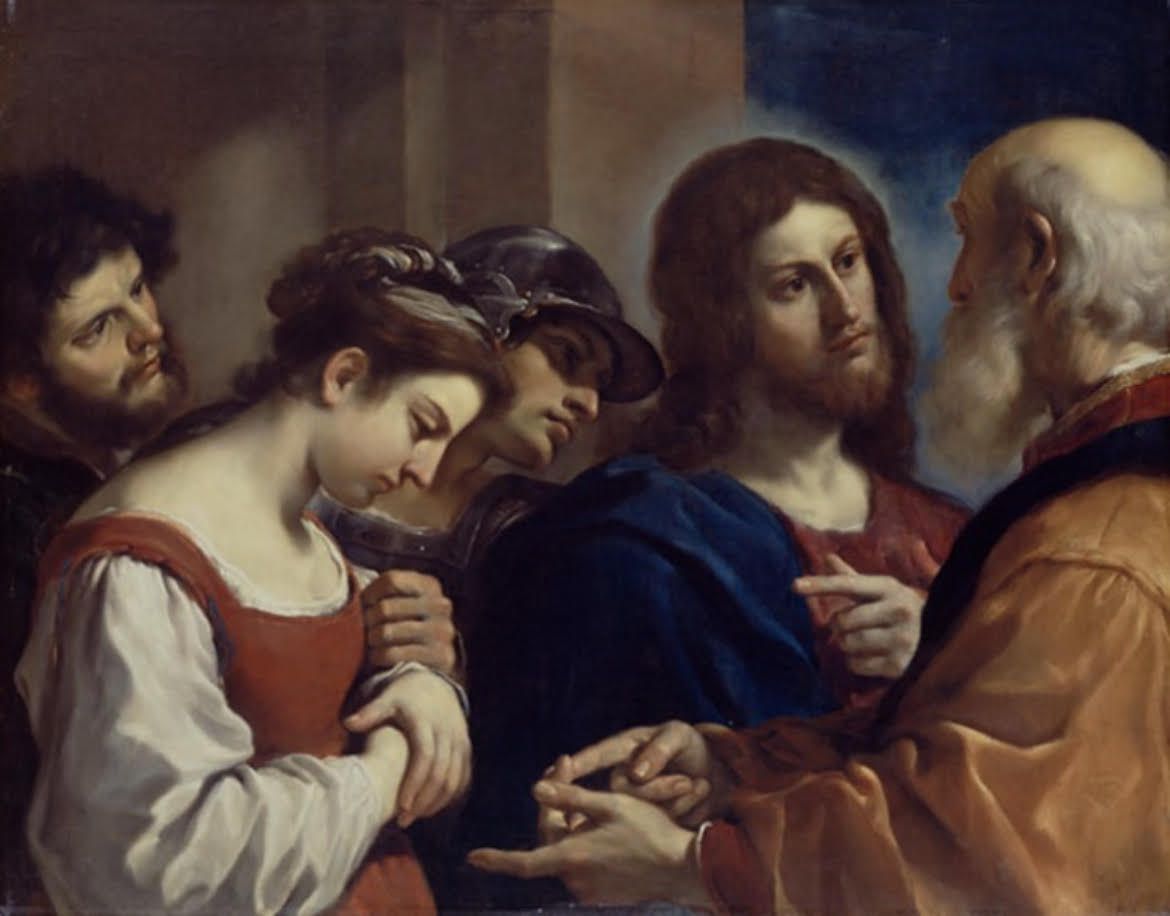5th Sunday in Lent
April 4, 2025
Gospel Reflection
John 8:1-11

Included in St John’s Gospel and none of the others is the episode of Christ’s public life read in today’s Mass. It appears to have happened during one of the last periods Jesus spent in Jerusalem, while he was teaching in one of the precincts of the Temple. It typifies the sort of provocative situation the scribes and Pharisees frequently created in order to discredit Jesus. A woman had been denounced as an adulteress and according to traditional law this merited death by stoning. It appears these leaders wished to put Jesus in a kind of trap. If he were to urge pardon for the woman this would amount to discrediting the Law of Moses. If he were to urge the assigned punishment, this would pit him against Roman jurisdiction which did not allow the Jewish authorities to apply capital punishment.
Jesus is able to show his compassion for the woman without incriminating himself. This he does by requesting that a man who has not sinned in some significant way be the first to cast a stone. Since the Pharisees were now surrounded by on-lookers, none was bold enough to present himself as without fault. The exercise had failed. Jesus had seen through their tactic. More importantly for the woman, she was to hear Jesus’ own words of pardon and his call to a sincere conversion.
Some commentators of the text have identified the woman as Mary Magdalene. However, this is uncertain. The important thing for us is to see how Jesus came to introduce a new era in God’s work of salvation—one that emphasizes how His justice is tempered by His mercy and how His desire is always for the conversion of the sinner.
The second reading, which is taken from Paul’s tender letter to his beloved Christians at Philippi, shows how deeply Christ’s love, forgiveness and call to ongoing conversion had affected him. On the one hand, Paul was overwhelmed by knowing Jesus to be the Son of God, the one through whom all things had come to be. On the other, he was deeply motivated by the knowledge that Christ knew him and loved him and wanted him to reach eternal life with Him. One also senses the genuine affection Paul felt for Christ as man, no doubt with his still vivid memory of Jesus appearing to him on the road to Damascus, and calling him by his name—Saul, Saul!
If only we would learn to love Christ this way. We have every reason to, even if He has not chosen to appear to us, or speak to us in a loud voice. We know that he died not only for Paul, but for each one of us. We know that he knows us by name. Our Faith, and to some extent human reason too, makes evident to us that in comparison with the things that we tend to love, be attracted to and even attached to, God must far outshine and out-merit them all. It is only that we cannot at present experience Him directly. We do not want this to hold us back from the kind of loyalty and dedication that Paul lived. We, at least, want to grow in love for Him through our love for Christ and for His Church. Even Paul felt his response was not yet perfect. In our case, what is needed is an on-going conversion starting from the point we now find ourselves at. The woman caught in adultery began from there. If she was Mary Magdalene, or at least someone with as sincere a conversion, she arrived at sanctity itself.
Jesus never wants evil. He only wants what is good and life-giving. Therefore, in his great mercy, he instituted the sacrament of Reconciliation so that no one will be lost, so that we can all find the forgiveness we need, no matter how great our mistakes have been. As Pope Francis said: “Let us not forget this: God never tires of forgiving us! The problem is that we ourselves get tired, we do not want to ask, we grow weary of asking for forgiveness. He never tires of forgiving, but at times we get tired of asking for forgiveness. Let us never get tired, let us never get tired! He is the loving Father who always pardons, who has that heart of mercy for us all. And let us too learn to be merciful to everyone. Let us invoke the intercession of Our Lady who held in her arms the Mercy of God made man.”[3]


